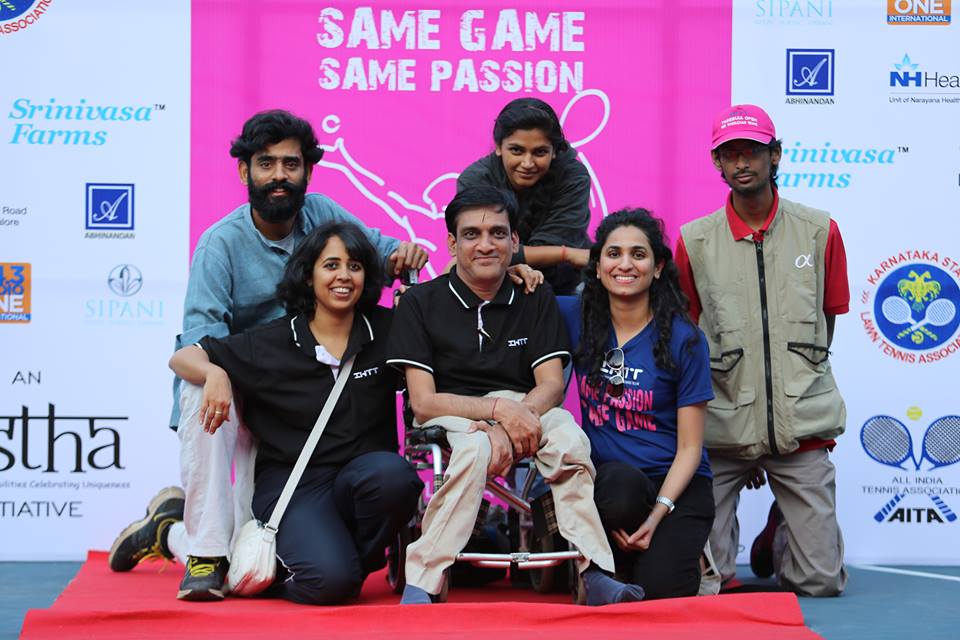FIRST STEP OF WHEELCHAIR TENNIS
When 18-year old American acrobat skier, Brad Parks, met an accident; little did he know that it would be the end of his flying career. The accident left Parks paraplegic, bounded on a wheelchair and constrained to a certain level. But Parks found a new lease of life when he first hit a Tennis ball sitting on a wheelchair. The American began experimenting with Tennis as a tool for recreational therapy during his rehabilitation days. Soon, Parks found his
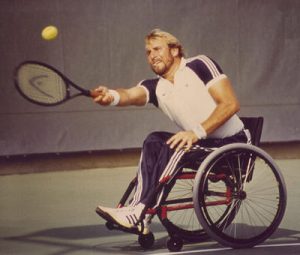
confidante in Jeff Minnenbraker, a wheelchair athlete, with whom he discussed at length about the possibilities of Wheelchair Tennis.
In 1977, Brad and Jeff started promoting Wheelchair Tennis across the West Coast of the USA through a series of camps and exhibitions. There was no modifications to the racquet or tennis balls that were used in normal Tennis. Brad and Jeff also kept the court size same. They just devised a lighter, slightly modified version of the conventional wheelchair to play Tennis. Through their sheer benevolence, the two sportsmen were able to convince the Los Angeles City Parks and Recreation Department to host the first-ever Wheelchair Tennis tournament.
SPREAD OF WHEELCHAIR TENNIS AND FORMATION OF INTERNATIONAL FEDERATION
The spread of Wheelchair Tennis led to the formation of Wheelchair Tennis Players Association (WTPA) with the
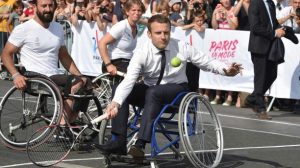
mission to include the increasing number of wheelchair-based players in the governance of the sport. With this Association, the sport spread from the USA to the world. Wheelchair Tennis took the shape of a movement in France. Popular French professional players such as Yannick Noah and Henri Leconte partnered with Wheelchair Tennis players in exhibition matches. Domestic tournaments were organised in the major cities of France including Paris. It was here only that the Open d’Antony, the first international tournament, was staged in 1983.
The further growth of the game in other parts of Europe led the International Tennis Federation (ITF) to consider forming a world-wide organization for the game. After much planning and consultation, the ITF adopted Wheelchair Tennis and thus on 10th October 1988, the International Wheelchair Tennis Federation (IWTF) was founded.
HARRY BONIFACE PRABHU- FLAG BEARER OF WHEELCHAIR TENNIS IN INDIA
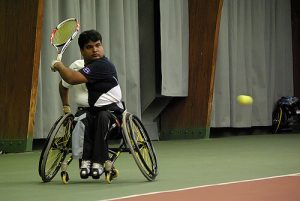
It was almost 8 years after the formation of the highest international body, the sport arrived in India. An India para sportsman, Harry Boniface Prabhu, attended the World Wheelchair Athletic Meet of 1996 in the United Kingdom. There he came across Wheelchair Tennis and developed an instant liking to it. After coming back, he started practicing it with local Tennis coaches. The Karnataka State Lawn Tennis Association permitted him to use their courts for his practice sessions. Prabhu was a fast learner and by 2000, he had participated in several international tournaments. Simultaneously, he started the Boniface Prabhu Wheelchair Tennis Academy, which was later merged with the All India Tennis Association (AITA).
SUNIL JAIN AS THE PROMOTER OF WHEELCHAIR TENNIS
But the promotion of the game was irregular and inconsequential. The tournaments that were organized, neither gave the players international exposure nor any rankings. Here stepped in Sunil Jain, the man affected by polio from his 18th month and never got to get up from the wheelchair. Sunil, an IIS fellow and chartered accountant, founded an NGO named Astha for igniting the dreams of the differently-abled and making them feel to be equal contributors to the growth of our nation. The organization undertook projects to discover challenges, create solutions and manage delivery of these solutions.
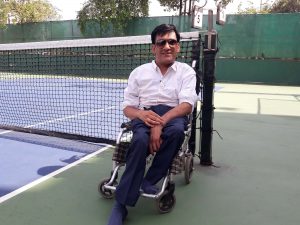
One such project that Sunil Jain commenced through Astha was the Indian Wheelchair Tennis Tour (IWTT), a national level tour to enable a vibrant competitive environment in the country for Wheelchair Tennis players so that there is greater participation at every level of the game. The IWTT was launched with the Tabebuia Open, India’s first ranking tournament for Wheelchair Tennis players. It was played in 2016 at Bengaluru under the aegis of AITA.
Remembering the initial days Sunil explained, “I took 5 years to decide what to do exactly and in 2012 I got the right focus. The primary reason for choosing Wheelchair Tennis was to rule out the challenge of classification, the technical aspect that is present in almost all para sports. There are only two simple classifications in Wheelchair Tennis- Open and Quads and that is not difficult to classify. Moreover, I found AITA to be a well-administered organization and is good to work with. So my work became a bit easier.”
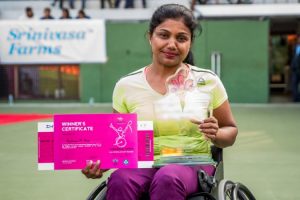
The first Tabebuia Open had 29 players that increased to 41 in the second edition. India’s top-ranked player like Shekar Veeraswamy, Balachandar Subramanian, Prathima Rao, Shilpa KP, Madhu Bargi, D Mariappan and others participated in the tournament. As Sunil Jain said, “AITA has now decided to rate these tournaments and rank the players,” so these tournaments under IWTT are the only options for the players to improve their game as well as their rankings.
HINDRANCES IN INDIA
IWTT has reached cities like Bengaluru, Chennai and Mumbai with latest initiatives like Weekend Workshops for Beginners to learn the basic rules of the game and basics of wheelchair, Orientation Programmes for Coaches and also Training Camps for seasoned players.
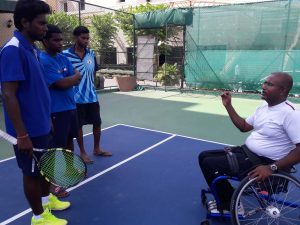
However, Anand Selvaraj, one of India’s top Wheelchair Tennis player and the Orientation head of IWTT, believes that India need a whole-hearted approach to develop the game. “I have seen how Sri Lanka, though being a small country, have undertook a robust Wheelchair Tennis programme. They are still not the powerhouse but in near future they will definitely compete with Asian countries like Japan, South Korea and others. But in India there is nobody who is willing to grow this game except few person like Sunil,” Anand repents.
Thus, in spite of the presence of talents in our country, Indian players often do not qualify for the rated international tournaments. This is because of the absence of proper ranking system in India. Anand revealed, “We will not qualify for the Para Asian Games in 2018 directly because of our rankings. But Sunil is trying to use the Bipartite Commission Invitation Allocation Method through which participation of top athletes is ensured who have not qualified for the event due to extraordinary circumstances.”
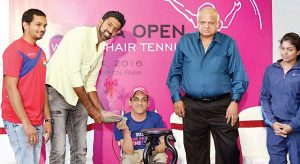
In the midst of all these intermittent possibilities, Sunil is optimistic about the growth of Wheelchair Tennis in India. “I do a lot of social-media campaigning, promotional activities and publicity for my sporting events. My target is to reach 5 more cities- Khamman, Chandigarh, Indore, Kolkata and Agra by the end of 2018. I feel what is most needed is the availability of sporting facilities for the wheelchair-bound players.”
As Sunil Jain appeals to people, corporate and sponsors to become benevolent supporters of Wheelchair Tennis, we hope that his efforts shall definitely change people’s perception. These athletes need a platform to build professionalism and IWTT is definitely the beginning of things to come.

